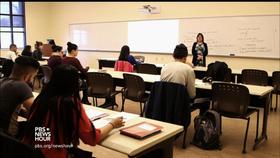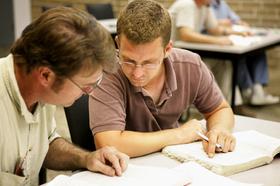In the past, students who struggled in high school often didn't even bother with the idea of higher education. After all, if secondary school was difficult, then college would be nearly impossible, right?
However, a push for higher college graduation rates by President Obama, as well as truths discovered about many so-called remedial students, has led educators in community colleges across the country to redefine remedial education. As times are changing, more students are turning to special community college programs that are helping them see success in their education and lives after college.
In this video, two students discuss how they ended up taking a remedial math class.
What is Remedial Education?
According to WiseGeek.com, remedial education is "education designed to bring students who are lagging behind up to the next level of achievement realized by their peers." Students who found themselves in remedial education often felt they didn't have much chance at academic success beyond high school. Those who did qualify for college entrance often dropped out within their first year because they simply didn't have the background knowledge or study skills to succeed in a college setting.
The good news is that these students now have hope for making it through college and earning a degree, thanks to programs that help students develop the skills they need to succeed in higher education.
The Need for College Success
According to an article at Diverse Issues in Education, the American Association of Community Colleges estimates that as many as 60% of all the students coming out of high school each year are simply not prepared for the rigors of college-level work.
Unfortunately, skipping college is not a viable alternative for many of these students, since additional studies have shown that high school graduates rarely find work with a sufficient income to support themselves and their families. College is a must for a decent future for many, but many are not prepared to succeed in college.
This video explains remedial education.
Getting Help
The Bill and Melinda Gates Foundation is just one of the organizations committed to helping colleges provide the necessary support to community college students. Melinda French Gates, the co-chair of the foundation, told the 90th Annual American Association of Community Colleges Convention in Seattle earlier this year, "Community colleges led the way on college access, now they must lead the way on college completion. Research shows that improving remediation is the single most important thing community colleges can do to increase the number of students who graduate with a certificate or a degree.”
According to a press release at the Gates Foundation website, the foundation has pledged $110 million to help create remedial programs, now referred to as developmental education, in community colleges across the country. These programs are intended to help students who enter college lagging behind the general student population to catch up to their peers quickly and effectively. The ultimate goal is to improve student retention and completion, increasing college graduation rates across the board.
This video looks at a college student who is unprepared for college-level academic work.
Digital Bridge Academy
Digital Bridge Academy is just one example of California schools putting their additional funding to good work, according to a report in Inside Higher Ed. This program was designed by community college and Harvard University Business School graduate Diego Navarro, who spent months interviewing at-risk students to discover the most efficient ways to help them graduate. The Digital Bridge Academy begins with a two-week session prior to the start of college classes, created to light a fire under students and motivate them for academic success.
After the initial session, students from the program receive ample support from one another by taking a full course load together for their first term. The courses allow students to explore topics they are particularly interested in, continuing their motivation throughout the term. All courses apply toward their associate degree program. At the end of the first term, students mainstream back into the regular courses, but continued support is available for those who require it.
Increasing graduation rates is a common goal for community colleges, but in the past, colleges have been hard-pressed to come up with a good solution. George Boggs, President, and CEO of the American Association of Community Colleges told Education Week, "One way [to improve graduation rates] is to develop admission standards, and if you don't let students in who are the weakest, your graduation rates will go up. Another way is to decrease quality. If you lower your standards, you'll get more students to the finish line. Neither one of those is a very good solution. We need to find more effective ways to increase our completion rates while maintaining open access and high quality."
With any luck, these new developmental education programs will answer the call.
Questions? Contact us on Facebook. @communitycollegereview














